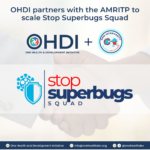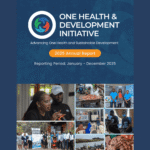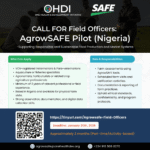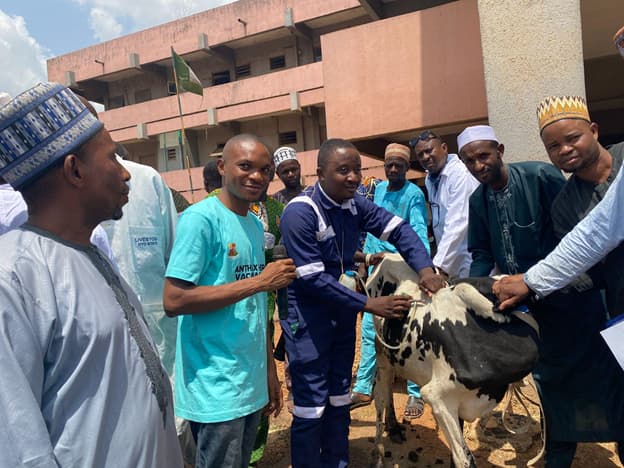
Anthrax Vaccination Flagship Exercise, Oyo State
An understanding of Anthrax
Anthrax is an infectious disease caused by the bacterium Bacillus anthracis. Anthrax is a major threat that has the ability to form resilient spores that can survive extreme conditions. Naturally, anthrax spores can linger dormant in soil for decades. When herbivores ingest the spores while grazing, the anthrax life cycle begins anew. From these infected animals, the disease can spread to humans through direct contact with contaminated animals or animal products like wool, hides, and bone. People in occupations that involve the processing of such animal products have historically carried an increased anthrax risk. It can also affect humans who eat half cooked meat from anthrax-infected animals.
No matter the mode of transmission – inhalation, cutaneous, gastrointestinal or injection – the signs of an anthrax infection are evident. A small blister or lesion can progress into a necrotic ulcer as the disease invades the body. Fever, respiratory distress, and toxemia can rapidly follow depending on the length and size of exposure.
How we have been involved in the fight against Anthrax
Due to the adverse effects of Anthrax on public health, we joined other players in the fight against anthrax. In collaboration with the Oyo State Ministry of Agriculture and Rural Development, we launched an aggressive public awareness and vaccination campaign centered in the farming community of Iseyin. Our two-pronged strategy focused on educating the public about anthrax transmission, prevention, and providing free, on-site livestock vaccination services.
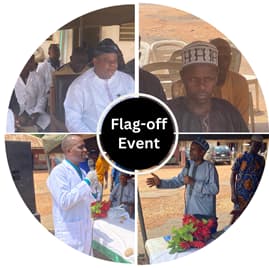
The first element of our strategy came on February 29th, 2024. We hosted a ceremonial flag-off event at the Iseyin Local Government Area Secretariat, bringing together cattle farmers, and veterinary authorities. Prominent veterinary figures who were at the event included Dr. Ibitoye M.M (Assistant Director of Veterinary Services) and Dr. Kareem A.A and Dr. Akibu from the Veterinary Services Department. At the event were government representatives including the representative of the Commissioner of Agriculture, the Chairman of Iseyin LGA, and community leaders such as the Head of Local Administration (HLA), Seriki Fulani, Miyetti Allah cattle breeders’ association, and Friesland Campina representatives.
Vital information about anthrax was provided in the local Yoruba language through presentations, flyers and posters to enable optimum uptake by our audience. Key figures like the Seriki Fulani, Alhaji Yakubu, and Dr Akibu from the Veterinary Services Department commended our potentially life-saving efforts and expressed hope for continued partnership in advancing animal welfare and veterinary services in the state.
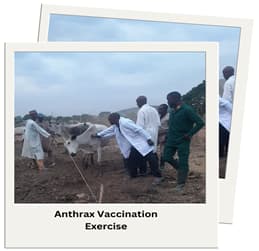
The second element of our strategy was the vaccination against anthrax. The vaccination programme benefited from the support provided by 14 skilled veterinary staff who were to administer 20,000 doses of anthrax vaccine to cattle. A symbolic vaccination of two cows kicked off the campaign in earnest. Later that evening, the full-scale vaccination exercise commenced at the Iseyin LGA farm in Ogba Kuta settlement, where 80 cows received the vaccine.
Over the next two days, our teams fanned out across four major Fulani villages – Oja Agbe, Yakubu Village, Sanko I, and Sanko II – vaccinating a total of 609 cattle on-site to shield these herds from infection. Over 110 cattle were vaccinated in Yakubu Village, 98 at the nearby settlement, 57 at Sanko I, and an impressive 264 at Sanko II. During the process, we urged farmers to take a 10 day selling break which would allow the vaccine to take full effect. We also cautioned them against using antibiotics that could interfere with the vaccination.
Based on their logical capabilities and technical expertise, FrieslandCampina, a dairy company with strong local ties to cattle farmers, was entrusted to continue the vaccination campaign that we initiated across more settlements in Iseyin with guidance from the LGA veterinarians. Combining our technical knowledge with their community networks and logistical capabilities, we aim to multiply our impact through this partnership.
Our commitment and Next Steps
Protecting community health is a collaborative endeavor – and OHDI is committed to forging lasting alliances that elevate animal health and public health through robust veterinary services and education. This anthrax vaccination drive represents just one battlefront in our mission to break the cycle of zoonotic disease transmission in Nigeria. By raising awareness, delivering preventative care, and empowering local stakeholders, we can transform a pivotal moment into lasting change.
The road ahead to achieving better public and community health is arduous, but our Iseyin intervention offers a powerful antidote against the complacency that enables anthrax to persist as a threat in Niger State. Tackling public health challenges effectively requires conviction, cooperation, and an unwavering belief in the One Health approach. At OHDI, we have rolled up our sleeves to continue strategizing and partnering – to safeguard both animal and human lives. This is our mission. And this is just the beginning of much greater impact to come.


